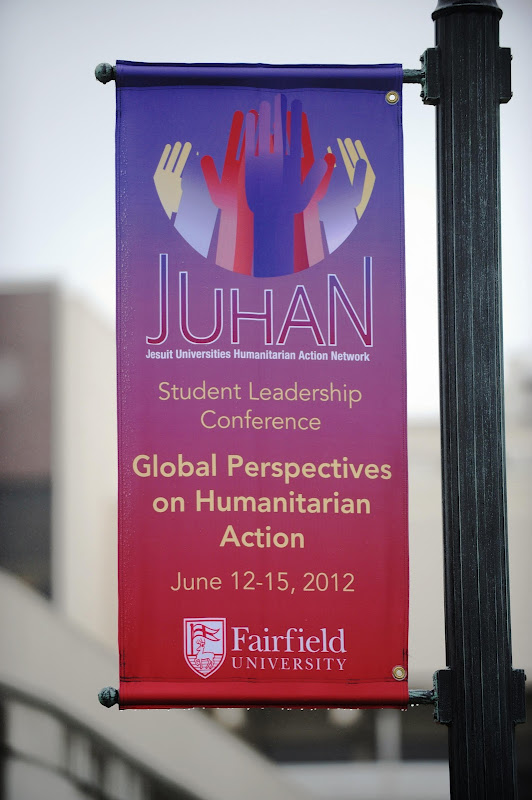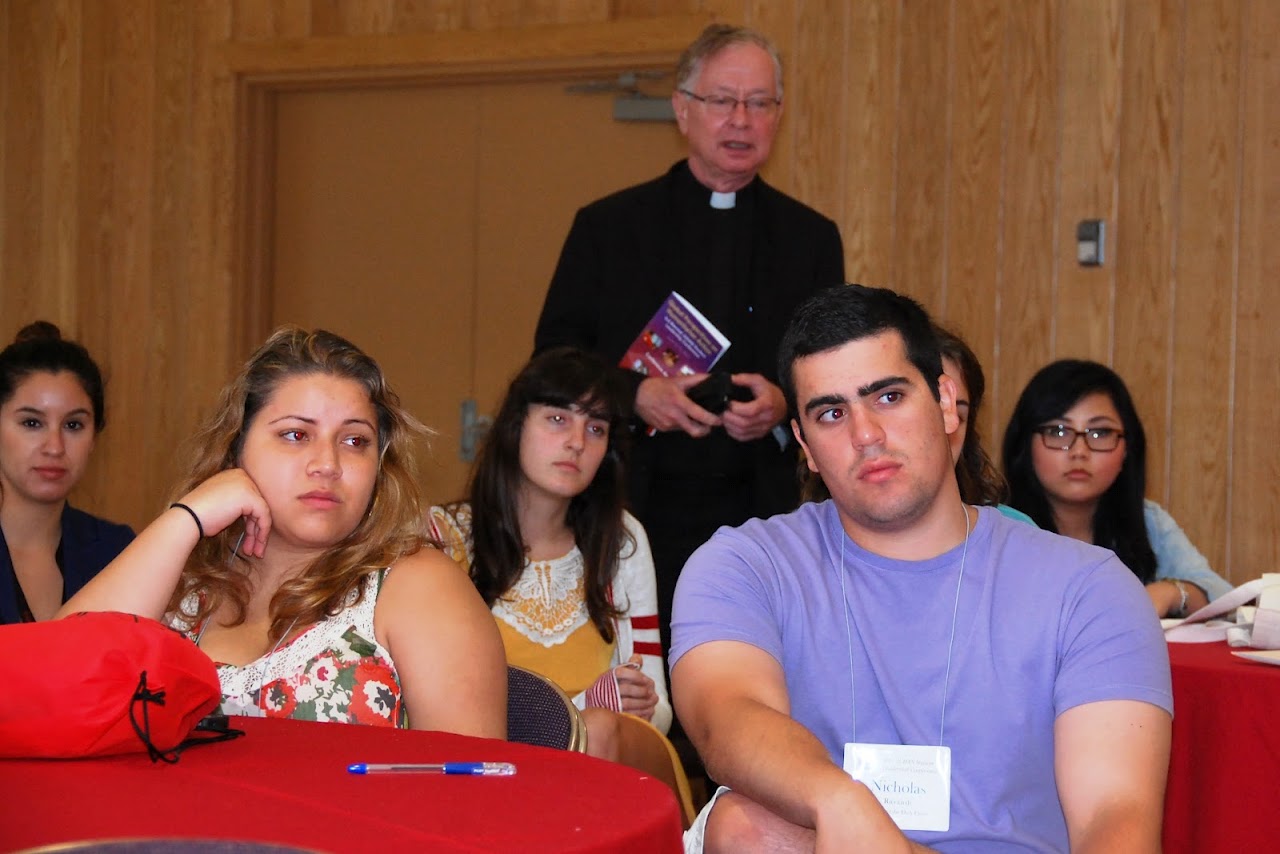JUHAN Conference Broadens Perspectives and Deepens Jesuit Higher Ed Involvement in Humanitarian Action
 More than 100 people took part in the 3rd biennial Jesuit Universities Humanitarian Action Network (JUHAN) conference from June 12 to 15, offering participants global perspectives on humanitarian action. Students, faculty and staff from 10 Jesuit universities in the U.S. attended, including Boston College, the College of Holy Cross, Fairfield, Fordham, Georgetown and St. Joseph’s from the three east coast provinces. And international students joining the conference from Jesuit higher educational institutions across the globe brought a crucial dynamic to conversations on humanitarian action.
More than 100 people took part in the 3rd biennial Jesuit Universities Humanitarian Action Network (JUHAN) conference from June 12 to 15, offering participants global perspectives on humanitarian action. Students, faculty and staff from 10 Jesuit universities in the U.S. attended, including Boston College, the College of Holy Cross, Fairfield, Fordham, Georgetown and St. Joseph’s from the three east coast provinces. And international students joining the conference from Jesuit higher educational institutions across the globe brought a crucial dynamic to conversations on humanitarian action.
Conference organizers from Fairfield University’s Center for Faith and Public Life (CFPL) intentionally invited and recruited international participants. Foundation funding deferred the traveling and registration costs, making that intention a reality as attendees hailed from Australia, India, Lebanon, Mexico, Nicaragua, Philippines, Qatar, and Tanzania. The presence of international students changed the dialogue about how to respond to humanitarian crises, as it including voices from countries often receiving international aid.
JUHAN conference attendees were drawn out of their comfort zone, gaining an important perspective: it is important to connect, communicate, and coordinate with the local community before taking action rather than simply entering into a community in crisis looking to fix a situation. International students also left the conference with a more global view. One student from Loyola College India, Keerthana Baskaran, believes JUHAN will help make her more Fairfield University President Fr. Jeffrey von Arx, S.J., opened the conference by sharing how important JUHAN is to fulfilling the purpose of Jesuit institutions of higher education, drawing on words and ideas from a talk given by Jesuit Superior General Adolfo Nicolás, S.J. in Mexico City. “It is the expressed mission of the Society of Jesus,” von Arx noted, “that our universities be engaged, hands-on, in the promotion of justice, and with putting our shoulders to the wheel to address the ‘gritty realities’ of a world in need. In forming the JUHAN project, we did so based on the recognition that our institutions…weren’t providing our students with the practical knowledge and the tools for putting their desire to be of service to work.”
 Over the course of three days, panels and workshop foci progressed from understanding our Jesuit identity that calls us to humanitarian relief work to learning how experienced professionals in the international aid field pursued careers in this work. The conference featured leaders from Jesuit run and affiliated organizations engaged in advocacy and direct service work, including the Center for Human Rights and International Justice at Boston College, the Ignatian Solidarity Network, the Jesuit Commons, and Jesuit Refugee Service.
Over the course of three days, panels and workshop foci progressed from understanding our Jesuit identity that calls us to humanitarian relief work to learning how experienced professionals in the international aid field pursued careers in this work. The conference featured leaders from Jesuit run and affiliated organizations engaged in advocacy and direct service work, including the Center for Human Rights and International Justice at Boston College, the Ignatian Solidarity Network, the Jesuit Commons, and Jesuit Refugee Service.
Camille Gomez, a student from Fairfield University, noted that experiences like the JUHAN conference, as well as a CFPL organized immersion experience in Washington DC focused on immigration and refugee issues, make it impossible for you to ignore the need and hurt in the world. For Camille, the fire lit in her heart by these experiences has made it impossible for he to go back to the life she lived before them.
Listening to a panel of new and senior executives from government and international relief organizations, attendees gained a sense of the varied type of work possible in this field. Panelists confirmed that nearly any academic focus could help prepare a person for a career in humanitarian aid and that volunteer opportunities (short-term and long-term, domestic and international) allow us to develop essential cross cultural and work skills. Informal roundtable discussions with panelists, gave participants an opportunity to have more personal conversations like balancing work with life and family. During one discussion, an international student reflected with gratitude on meeting Kelly Ryan, Acting Deputy Assistant Secretary for Immigration Policy at the Department of Homeland Security; the interaction changed her view of the American government, realizing there are people in government interested in working together across political lines to solve pressing issues.
The conference also offered participants hands-on training and practical tools to support future pursuit of humanitarian relief work. Throughout the conference, a number of attendees engaged in an online humanitarian crisis simulation. Groups worked together to discuss how to respond to ongoing developments; at the same time they formed relationships and built community outside of their university cohort. On the last day of the gathering, Catholic Relief Services conducted an advocacy training and an introduction to the Global Solidarity Network, an educational resource on international development issues and advocacy opportunities. Faculty and staff received the JUHAN Assessment Toolkit at the conference, a new resource designed to disseminate inter-institutionally approved humanitarian action learning goals and outcomes to aid in the development of JUHAN approved courses.
JUHAN participants headed home with inspired by the passion and commitment to justice, as Fairfield student Gaelle Isazu illustrated saying, “I enjoyed going to the discussions. They were very informative, inspiring and eye opening. Seeing other students like me from across the country and the world, fighting for the same issues and more that I have just been exposed to, lets me know that I am not alone in my dream to change the world.”
CFPL conference organizers have a lot of hope that JUHAN will continue to grow after this conference. They look forward to creating a steering committee to establish infrastructure for the network and stimulate activity between conferences. There are only formal JUHAN student groups on a handful of campuses, and there is desire to develop a model to increase the JUHAN presence.
JUHAN is a collaboratively aims to increase the effectiveness of efforts by Jesuit universities to respond to humanitarian crises throughout the world. For more information on the conference visit the Center for Faith and Public Life’s website.
Click here to see a slideshow from JUHAN 2012.